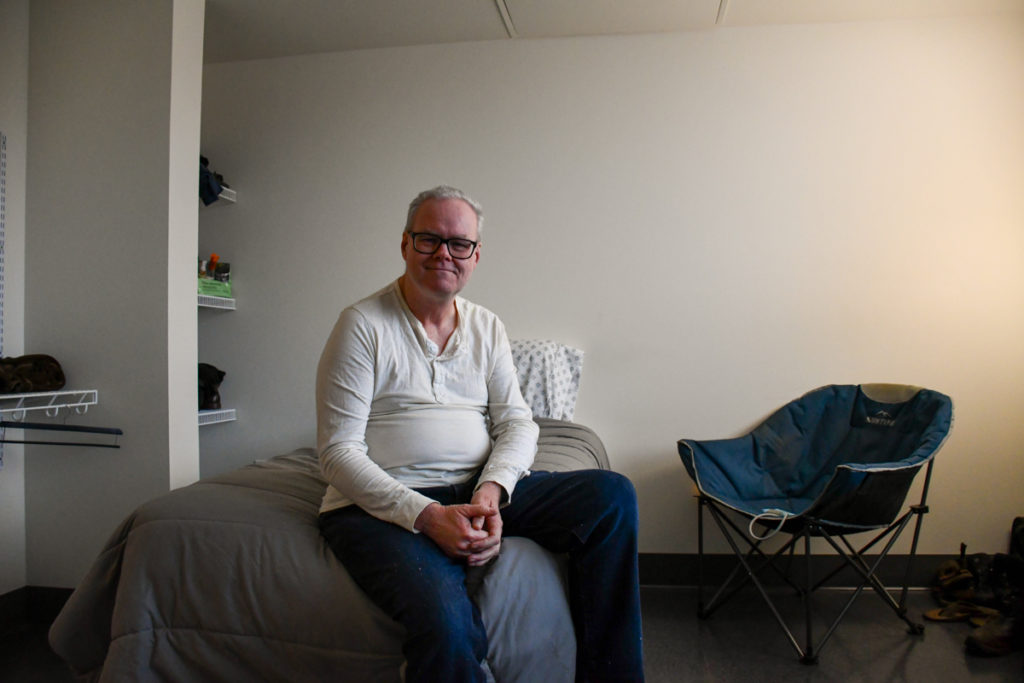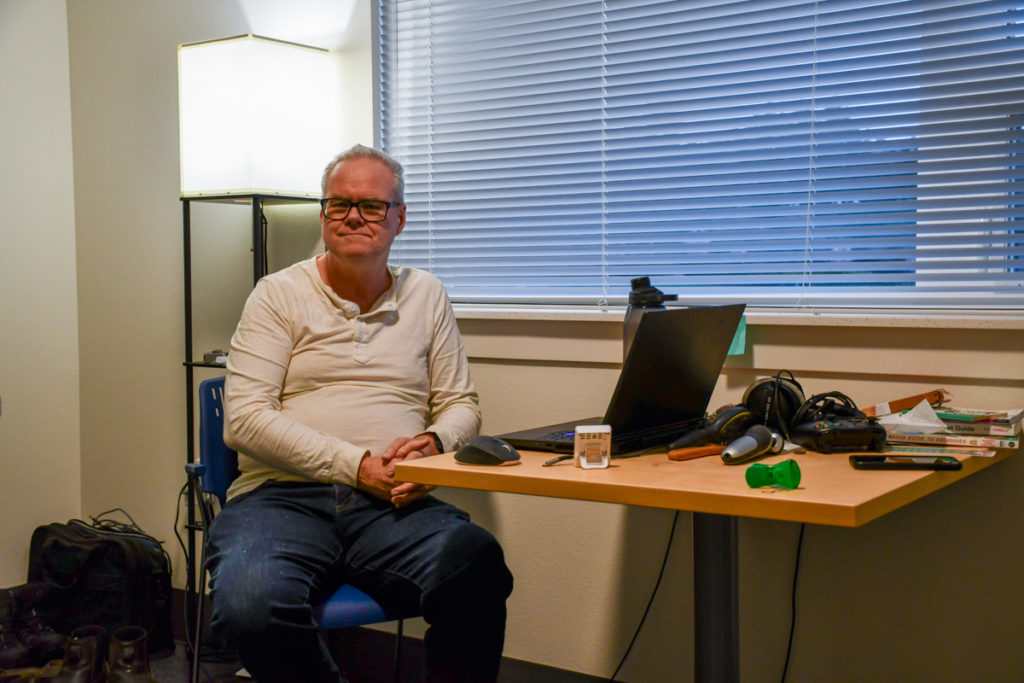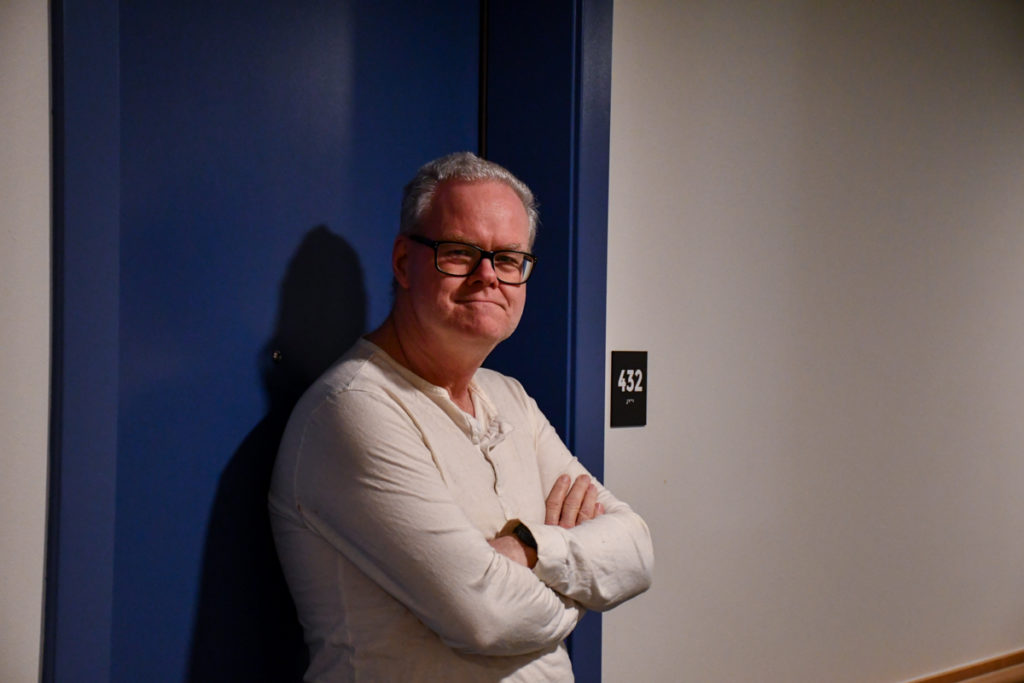From Redmond to Plymouth Crossing: Eastside Resident Michael Starts a New Chapter
Posted March 1, 2024

*Content warning – this post discusses suicidal feelings.
Seven years ago, a series of events left Michael in a tough financial situation. The government grant that was helping him pay for a two-year IT training program was unexpectedly discontinued. Then, a conflict between his two roommates resulted in both of them moving out suddenly.
“They left me holding the bill for a two-bedroom apartment, which I couldn’t even begin to service,” Michael said. “They put in a request to evict me. After trying to contest it through a lawyer, I finally decided it would be better to move into a minivan.”
Michael lived out of his van for years, supporting himself by taking on various IT jobs around the Seattle area. Eventually he was able to save up enough money to replace his van with a used RV. He described the relief of having more space: “Finally, for the first time in four years, I had a living space that I could stand up inside of, versus just crawling around in the minivan.”
One of Michael’s IT jobs during this time brought him to the city of Redmond, where he discovered a scenic and lively community that supported his many interests. Outside of his profession, Michael loves learning about aerospace technology and planetary geology. He enjoys taking photos with his DSLR. He’s an avid racing fan. Perhaps his foremost fascination, however, is with animals. Michael holds a deep appreciation for how animals live and interact with their environment and relishes taking walks outside. Naturally, the abundant green space in Redmond had major appeal.
“It’s a good mix of urban and wildlife areas,” he said. “Farrel-McWhirter Park is a wildlife park that has a petting zoo. I like that I can get out there and be in the woods.”
Michael also found opportunities to connect with likeminded individuals while living in Redmond.
“I made a lot of friends in the various coffee shops I would go to. We liked going to the Redmond Mall where there’s a place that offers simulation racing. Three or four of us would race on tracks around the world that we’ve only ever seen on television. There’s just really a strong sense of community in Redmond,” he said.

While Redmond nourished Michael on a personal level, work wasn’t going as well. Michael has ADHD and Autism Spectrum Disorder—two conditions that have made navigating interpersonal dynamics at work challenging.
“Because of the ADHD, my socializing is not as well-developed as most people, and I have a really big problem recognizing social cues,” he shared. “For example, if someone is upset with me, but they’re trying to be subtle about it, I can’t understand that. Pretty much throughout my work life, coworkers have gotten to the point where they’re like, ‘I can’t understand this guy, I don’t understand where he’s coming from, and I really don’t want to be around him anymore.’ So it’s rejection after rejection after rejection. Over the past few years now, most of my jobs have lasted from about one to three months. And so I’ve gone from that, to no income, to wondering how I’m going to get by. I’ve had to borrow from friends or family, and of course that’s created a heck of a lot of stress, suicidal ideation, and things like that.”
It was at this low point that Michael met Tisza Rutherford, homeless outreach administrator with the city of Redmond.
Tisza initially reached out to Michael at his RV, and the two stayed in regular contact after that. When Plymouth’s permanent supportive housing (PSH) building Plymouth Crossing opened in Bellevue, Tisza presented it as an opportunity for Michael to get into a stable living situation and receive help with his physical and mental health challenges.
Michael was cautious about the idea at first, having heard negative rumors about drug use and crime within PSH. After researching the project and learning more about the Housing First philosophy, he felt more inclined toward the opportunity.
Plymouth partners with human service organizations and municipalities on the Eastside so they can refer individuals experiencing homelessness locally into Plymouth Crossing. Tisza worked with Michael to do just that. Last fall, he moved from his RV into a studio apartment at Plymouth Crossing.
“In the four months I’ve been here, it’s just been a really great experience,” Michael shared. “I’ve gotten to know a lot of the case workers, and we all get along and interact really well together.”
Thanks to a pilot program at Plymouth Crossing, Michael is receiving clinical health care services right where he lives. A registered nurse checks in on him weekly to help manage his type 2 diabetes and other health concerns. He’s also started working with a mental health care professional on-site.

Now that Michael is in a more stable living situation and receiving support, he’s looking ahead to the future.
“What’s next is I’m waiting to find out whether I’ve been approved for disability income. If I am, I want to take care of some bills and things that have been neglected for a while. After that, I’m interested in doing volunteer work with the Cougar Mountain Zoo. They have three cougars over there and a wolf pack.”
Where Michael’s journey over the last seven years began with doors closing, moving into Plymouth Crossing has opened new ones. Michael is receiving the type of support and level of stability that suit his unique needs. The stage is set for him to not only rebuild his life but also give back to his community in ways that energize rather than stifle him—by sharing his abundant knowledge and passion with the world.
***
If you are in crisis, you can contact the 988 Suicide & Crisis Lifeline 24 hours a day, seven days a week, 365 days a year. You can get help by calling or texting 988 or chatting online at Lifeline Crisis Chat.
For crisis line information related to specific groups such as aging adults, LGBTQIA2S+ Service, Veteran Resources, the Washington Recovery Helpline and more, visit the Washington State Department of Health website.